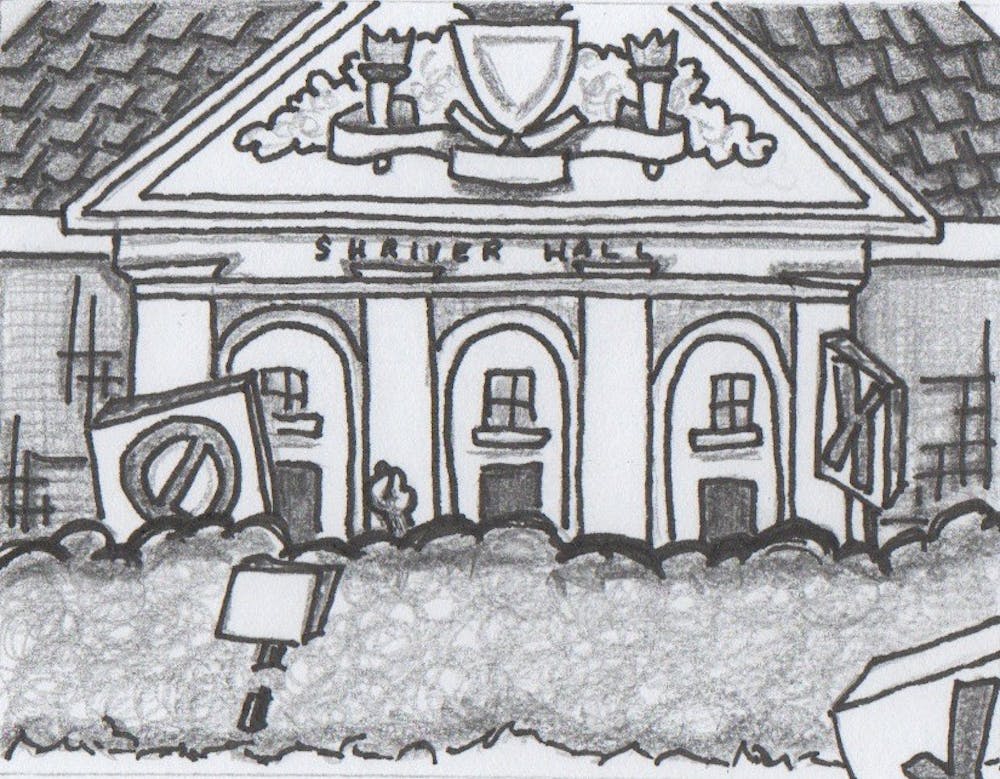By ANNIE DAVIS
The anti-Dershowitz petition currently under circulation is a shameful attempt to silence free speech under the guise of worthy causes unrelated to the subject of Dershowitz’s presentation. The petition accuses Dershowitz of trivializing sexual assault, plagiarizing another’s work and shutting down discourse on his political views. It seeks to ban him from campus out of respect for victims of sexual assault in the name of academic integrity. Inn so doing, it gives itself away as being politically motivated.
Theodore Kupfer has already published a cogent refutation of the petitioners’ claims (see The News-Letter, “Dershowitz Petition Lacks Validity;” Kupfer disclosed his sources in his original Facebook post). I seek to supplement his work by further addressing the shoddiness of the petition’s sources. First, the allegation that Dershowitz trivializes sexual assault is based on his professional statements as a defense attorney. As Kupfur notes, accused criminals have a Constitutional right to legal counsel; Dershowitz defends alleged rapists not out of personal sympathy but because all citizens have the right to be represented in court. I will add that because Dershowitz made the remarks about his clients’s accusers in the context of his professional and Constitutional obligation to defend his clients to the best of his ability, the statements have no bearing on his personal opinions (whatever they may be). The nature of being a trial lawyer is that one must cast doubt on the testimony of the opposition’s witnesses. The statements the petitioners cite as evidence that Dershowitz trivializes sexual assault were made — if they were made at all — in the professional context of discrediting his client’s accusers. The statements in no way reflect his personal opinions on sexual assault and thus do not constitute legitimate evidence against him.
Let’s look at the petition’s sources. To support their claims that Dershowitz bullies rape victims and uses shady investigatory tactics (such as sending private investigators to witnesses’s homes and spying on witnesses’s Myspace pages), the student groups cite articles that are unsubstantiated or non-objective. The first, published in The Guardian, presents its accusations of Dershowitz’s conduct as fact without providing requisite proof. The one letter that it references and identifies as Dershowitz’s has nothing in it to suggest that Dershowitz’s alleged investigatory techniques were inappropriate — especially since he himself sent the letter to the Palm Beach Police Department. The second article is from Ring of Fire, an overtly-partisan “News” source that drew much of its information on Dershowitz from the anti-Israel and, many believe, anti-Semitic website Electronic Intifada (which was another source the student groups cited and whose vitriolic bias Kupfer has exposed). In her defense of the petition, Miranda Bachman announced that “offensive” citations of Electronic Intifada had been removed from the document. Evidently, the petitioners missed one. They would do well to remove it too — not only because it is bigoted and therefore offensive, but because it is dishonest. At this rate they will soon have no sources with which to support their accusations.
The allegation of plagiarism also stems from unreliable sources. Kupfer has revealed that the author Norman Finkelstein originally made the accusation as part of his vendetta against Dershowitz, and it was quickly found to be untrue. It is also worth noting that the source upon which the petitioners base this claim is an anti-Israel article (tellingly titled “Dershowitz v. Finkelstein: Who’s Right and Who’s Wrong?”) on the website CounterPunch, which, like Ring of Fire, publishes clearly biased articles that any objective newspaper would relegate to its Opinion section in the interest of journalistic ethics.
As to the petition’s contention that Dershowitz attacks his critics rather than engaging them — one can easily ascertain the inaccuracy of this assertion. Simply go onto YouTube, type “Dershowitz debate” in the search bar and enjoy dozens of videos of lengthy debates between Dershowitz and his critics. So much for stifling discourse. Alternatively, ask Dershowitz a question when he comes to speak on Nov. 10 — the tougher the better. Why hide behind the convenient assumption that he will not answer?
Hopkins students know the difference between legitimate and illegitimate sources. It follows then that the petitioners reference the above articles as part of a desperate effort to silence Dershowitz by any means. The logical question to ask is, why? Do the petitioners truly believe, on the basis of unfounded allegations, a poor understanding of the American judicial system and academia and unreliable sources, that Dershowitz is guilty of the crimes of which he stands accused? Or, more likely, do they wish to prevent him from expressing his renowned political views about which they have already made up their minds and which they do not want other students to hear? It cannot be a coincidence that most of their sources have an anti-Israel agenda. If the student groups are, in fact, politically motivated, then their petition’s invocation of academic integrity and sensitivity toward sexual assault victims is a cowardly attempt to conceal their real intention of perpetrating the same thing that they accuse Dershowitz of doing: preventing the exchange of ideas. It is disheartening that Hopkins Feminists, the Sexual Assault Resource Unit (SARU), the Diverse Sexuality and Gender Alliance (DSAGA), the Black Student Union and Voice for Choice would misuse the very causes they purport to defend by means of a petition that is as hypocritical as it is dishonest.
Annie Davis is a senior history major from Boston.





